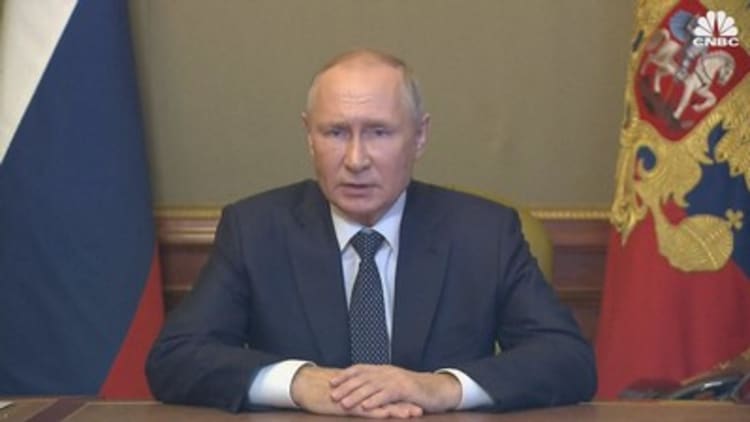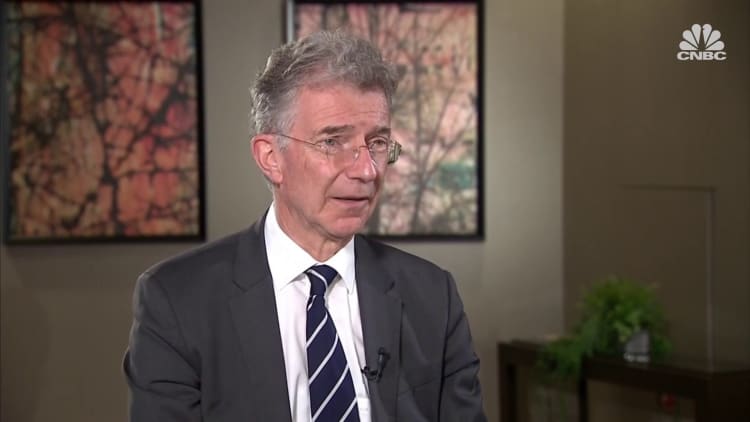Russia has dramatically ramped up its missile attacks on Ukraine in the last 48 hours, but experts say the country is running out of options — as well as supplies and munitions — on the battlefield.
Air raid sirens were once again sounding out across multiple regions of Ukraine on Tuesday, with emergency services warning that more Russian strikes were highly likely. Ukrainian officials reported that energy infrastructure in the western city of Lviv had been hit earlier, while the city of Zaporizhzhia in the south was also targeted in the morning.
The latest strikes come a day after a series of Russian attacks — launched in response to the bombing last weekend of Russia's prized Kerch Strait Bridge to Crimea — hit various Ukrainian cities, including the capital Kyiv. The strikes left at least 19 people dead and over a hundred injured, the emergency services said.
Ukraine's leadership has said it will not be intimidated by the latest spate of attacks, with President Volodymyr Zelenskyy vowing to inflict more pain on Russian forces on the battlefield.

Supplies running out
Despite Moscow's recent show of strength in the last day or so, experts say Russia's forces are looking increasingly desperate and ill-equipped.
"We know – and Russian commanders on the ground know – that their supplies and munitions are running out," Jeremy Fleming, director of GCHQ, one of Britain's top intelligence agencies, will say Tuesday.
"Russia's forces are exhausted. The use of prisoners to reinforce, and now the mobilisation of tens of thousands of inexperienced conscripts, speaks of a desperate situation," he will say at the annual RUSI lecture, according to pre-released comments.
The Russian population is beginning to understand the reality surrounding the war, according to Fleming. "They're seeing just how badly Putin has misjudged the situation. They're fleeing the draft, realising they can no longer travel. They know their access to modern technologies and external influences will be drastically restricted. And they are feeling the extent of the dreadful human cost of his war of choice."
Far from "the inevitable Russian military victory that their propaganda machine spouted," it's becoming clear that Ukraine's bravery on the battlefield and in cyberspace, counteracting Russian propaganda, is "turning the tide" in the war," Fleming will say.
In the meantime, Russian President Vladimir Putin's decision-making is looking increasingly flawed with "a high stakes strategy ... leading to strategic errors in judgement."
CNBC has contacted Russia's Ministry of Defense for a response to Fleming's comments and is yet to receive a reply.
Fleming is not alone in believing that Russia is in the death throes both in the war — and back home.
Christoph Heusgen, chair of the Munich Security Conference, told CNBC last week that there are signs that Russia is "falling apart."

"It's a black hole [in] Russia," he said. "Putin has the monopoly on communication, on the media, his popularity remains high but left and right, things are falling apart. The military is under severe criticism, industry is not producing, and there are signs that the country is falling apart but it's difficult to see how this will play out and how long it will take but the end of Putin's regime is going much faster," he told CNBC in Warsaw, Poland.
"Would you have believed that Ukraine's military is where it is today, and they're advancing?"
'Push back against the aggression'
The multiple attacks Monday on Ukraine came after a strategic and symbolic blow for Russia: an explosion that partially destroyed the Kerch Bridge that links the Russian mainland to Crimea, which Moscow illegally annexed in 2014.
Kyiv has not claimed responsibility for the bridge attack, although the blast was widely seen as humiliating for Moscow and creates another obstacle to Russia supplying its troops in occupied areas of southern Ukraine.
Zelenskyy said in his nightly address Monday that Ukraine will not be intimidated by the strikes, vowing that the battlefield would become even "more painful" for Russia in response.
Lesia Vasylenko, a Ukrainian lawmaker, agreed. She told CNBC on Tuesday that the country was prepared for more Russian attacks.
"We were not intimidated on the 24th February [when Russia's invasion began], we were not intimidated eight years ago and we were not intimidated for centuries," she told CNBC's "Squawk Box Europe."
"The only way to survive this reality is to push back against the aggression, to push back against the Russian military."


